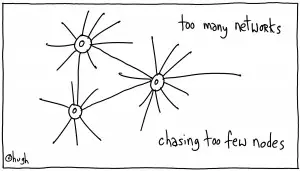Network overload: The burden to deal with too many social network sites
Next to information overload, probably comes network overload. Each day a new social network website appears. Another temptation for information and exchange, and again: new registration, same profile and more information to lock up. But with every new social network come along the questions: What about the filters? How do I get relevant information from my community? And, how do I manage all these memberships?
Challenge 1: Managing networks One easy example are profiles. Can you remember all of the websites on which you have created a profile, and which may even be long outdated? Why is not there a mechanism that allow you to include only one profile across social network websites? One such failed and disappointing attempt was Open Social, initiated by Google about two years ago. Some neat widgets can be integrated across social network applications, but altogether, social network sites often remain walled gardens. Unfortunately, open source solutions are not offering such mechanism (standards) either. Please let me know if you know of one.
One small solution – albeit only half step – to at least avoid working with countless logins is called Open ID, which works with several websites. You have got your login information on one server and can connect other websites through it, which theoretically can see only the information you want them to provide.
Challenge 2: Getting the information from networks
Who has got the time to log in to all different social network sites?
It becomes a hassle to log in and search for the latest information. I find that in many communities only bits and pieces are really relevant and interesting to me, but to only have access to that information is quite tricky – one way is to subscribe via RSS or emails. At Ning, you get a feed telling you each little nonsense detail: “A is now friends with B”, “C commented here”. The result is information overload. With emails you only need to persistently scan email content. I wish there was a dashboard of all of my community, which allowed me to filter all the information and stay on top of the news.
Challenge 3: Loose networks What I love about blogging is that – on the contrary to social networks – each blog is part of a network, and bloggers and commenters create meaning through linking posts from different blogs. Relevance is something social networks are missing. For example, if I am interested in waste water projects in Eastern Africa, I would love to discover the given networks across websites, but more often I have to search countless islands of well intended social network websites. Websites such as the social bookmarking website "delicious" still create more relevance through a simple tag; what countless social network websites have not yet achieved.
Where are the brilliant solutions to link better relevant information?
You still need to find your human information hubs for best information. Technical help is not offered yet. Unfortunately there is now a lot of emphasis on real-time solutions and too little work on filters and creating relevance. As a result some of my friends and colleagues are leaving Facebook. Too much noise, too little benefit.
